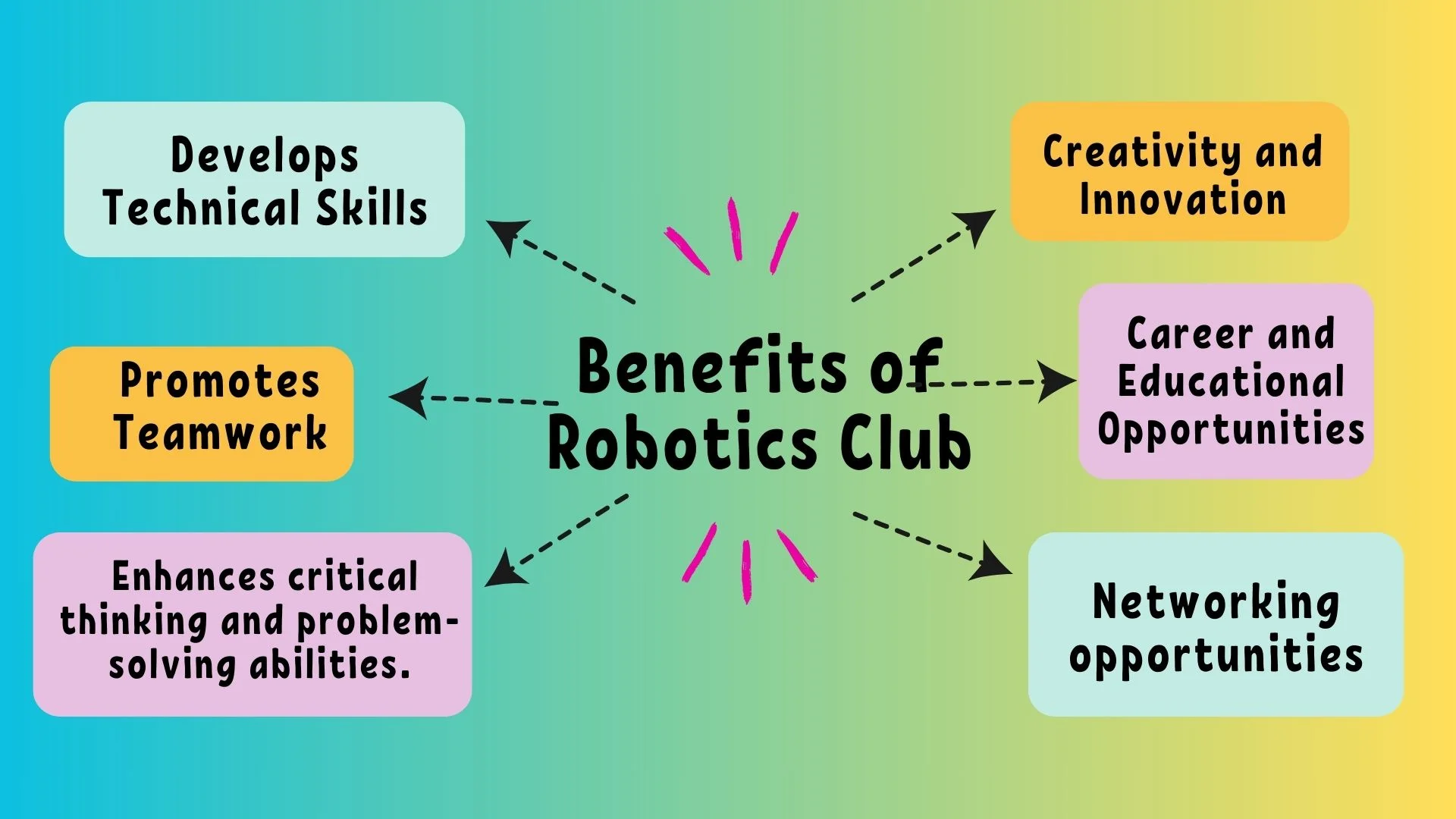Are you someone who loves robots and wants to connect with others who share your interests? Joining a robotics club would be the ideal option. But, what if you don’t have any robotics club in your school or college?
Have you ever thought about starting your very own robotics club? It’s a great way to hang out with friends who also love robots, learn lots of new stuff together and make robotics for kids fun. Imagine building robots and having fun while doing it with your pals! Plus, being in a robotics club means, you can join robotics competitions, show off your projects, and learn from each other.
If you are in elementary school, middle school, high school, college graduate or even a parent and can completely relate to this, then you are at the right place.
In this blog, we’ll explore why starting a robotics club is beneficial and how to start a robotics club.

HOW TO START A ROBOTICS CLUB?
1. Market Analysis/Survey
Before starting a robotics club it is necessary to research the market. First, you need to figure out if enough people are interested in robotics, who they are, and what they want to do in the club.
Also, there are other robotics clubs from which you can take inspiration and consider them as your competitor, then focus on competitor analysis by understanding what unique benefits and specialized expertise your competitors are offering. After that using insights from the market survey, organizers create a customized plan, including robotics club activities, curriculum, and structure.
2. Acquire Funds and Resources
Find out the tools, workspace, and robotics kits that you’ll require. Look for grants, businesses, or groups in your community or school to get financing. You can even obtain funding or sponsorships by forming alliances with nearby STEM-focused businesses or academic institutions.
3. Provide Opportunities for Training and Learning
Provide members with workshops or training sessions to impart important skills like electronics, mechanical design, programming, and teamwork. To enhance robotics learning, make use of tutorials, web resources, and guest lecturers. Encourage participants to work together on projects where they can impart their knowledge and learn from one another.
4. Recruitment and Marketing
Grabbing the attention of interested people through marketing and outreach is essential since it will make your group visible and familiar to the public.
a. Make yourself available on all the platforms of social media.
b. Engage with local schools, youth organizations and community centers to attract a diverse group of participants.
c. Create your social presence by posting about your club through reels or interactive posts.
d. Distribute pamphlets in your community centers.
e. Leverage trends and buzzy content.
f. Create awareness about your club through various WhatsApp, Facebook, and other social media groups.

5. Mentorship Program
Organize lectures or seminars and invite experienced members or external mentors to share their knowledge and wisdom with the young members of the club. Pairing highly skilled mentors with young learners accelerates the learning process and fosters a sense of community within the groups.
6. Elect a club president
Delegating responsibilities is always better and helps in this smooth functioning that is why electing robotics club president serves several important purposes:
i) A club leader provides direction for the club. They oversee club activities, coordinate meetings and ensure that projects are progressing smoothly.
ii) The president is responsible for organizing robotics club activities, events, and meetings. Also, they serve as the primary representative of the Robotics Club.
iii) The president facilitates communication within the club, ensuring that members are informed about the upcoming events, deadlines, and important announcements.
7. Take Part in Projects and Competitions
Organize workshops and lead robotics projects that complement the objectives and passions of the group. Take part in regional or national robotics tournaments to test members’ abilities and provide challenges. Take advantage of competitions to foster teamwork, problem-solving skills, and the application of information in practical settings. There are several robotics competitions like VEX Robotics Competition, The Moonbattle Conference 2024, First League Robotics and much more.
8. Establish Club Structure & Leadership
Specify the positions and duties of committee chairmen, president, vice president, and treasurer in the club. Establish precise rules for club governance, decision-making, and avenues of communication. It will help in the smooth functioning of the club, promote opportunities for members to grow as leaders so they can assume leadership positions within the club.

9. Robotics Club Manifesto
Having a clear plan for what you want to do in our robotics club is super important. It’s like having a roadmap. This plan is called manifesto, It is like our Club’s guidebook.
It explains the club’s objectives, the rules that must be followed, and what members can expect from their membership. So, your club’s manifesto should include all the rules and regulations, perks, membership benefits and much more.
10. Sustainability and Long-Term Planning
To make sure the robotics club survives past the original founding members, create a sustainability strategy. Keep a record of club events, materials, and best practices to help future generations of members transmit knowledge. To obtain long-term support and resources, look for options for partnerships and cooperation with other robotics organizations, alumni networks, and industry partners.
11. Encourage Collaboration and Inclusivity
Create a welcoming atmosphere where everyone is encouraged to participate and feels appreciated. Promote cooperation, inventiveness, and originality through group assignments, ideation sessions, and peer review. Emphasize that the club’s success hinges on members’ ability to cooperate, communicate effectively, and respect diverse perspectives.
12. Evaluation and feedback
To determine areas for improvement, evaluate the success of club activities, and handle any issues or difficulties, ask members for their comments on a regular basis. To perform more outstandingly it is always better to take the feedback from the members of your club about whether they are satisfied or not or, do they want something extra to be introduced. If the customers are happy the company or the club will obviously going to flourish.
These pointers will help you create a dynamic robotics club that teaches members vital skills, encourages collaboration, and ignites a passion for robotics.

WHAT DO YOU DO IN THE ROBOTICS CLUB?
1. Building and programming robots
Members work together to design, construct, and program robots using beginner robotics kits or custom-built robotics components.
2. Competing in robotics competitions
Clubs often participate in local, regional, or national robotics competitions where they pit their creations against others in challenges that test their design, programming, and teamwork skills.
3. Learning and skill development
Members learn about robotics concepts, programming languages, electronics, and mechanical engineering through workshops, tutorials, and hands-on projects.
4. Collaboration and teamwork
Robotics clubs foster teamwork and collaboration among members, allowing them to share ideas, troubleshoot problems, and work together towards common goals.
5. Outreach and community involvement
Robotics club activities like workshops, shows, or mentorship programs are organized for young students to support STEM education and spread the joy of robotics in their communities.

6. Field Trips
Many robotics club organizes trips to various robotics labs, companies or conferences to expose members to industry professionals and to get more deep knowledge about the latest advancement in robotics. Through this they get to increase their knowledge in this field by having fun at the same time.
7. Inviting Guest Speakers
Inviting guest speakers to your club is an excellent step as they will enhance the value of the club.
i. Guest speakers can provide in-depth knowledge on specific topics within robotics. They can share their career journeys highlighting the diverse career paths available in robotics.
ii. They can also provide advice on pursuing education, internships and job opportunities.
iii. Guest speakers can benefit club members, as they have connections in the robotics industry or Academy which can provide them more opportunities or collaborations on projects.
iv. The speakers may offer hands-on workshops or demonstrations related to their area of expertise, allowing club members to gain practical skills and experience in robotics technology.
HOW IS THE ROBOTICS CLUB BENEFICIAL?

Learning robotics offers significant advantages, as it can simplify the understanding of STEM easily and excitingly.
However, there are various other benefits of joining a robotics club:
a. Robotics club provides hands-on experience in STEM-related fields.
b. The club offers practical knowledge instead of the theoretical one learned in the classroom or online robotics class.
c. Building robots and solving challenges together in a team, improves critical thinking and problem-solving skills. Furthermore, it helps in developing leadership qualities.
d. Creating and designing robots always includes brainstorming and thinking out of the box to come up with innovative ideas. This encourages children to be creative, and mindful and develops an entrepreneurial mindset.
e. Being a part of a robotics club, exposes children to real-world applications of technology, like automation, artificial intelligence, and machine learning, which prepares them for future careers in technology-related fields.
f. Competitions and challenges always provide opportunities, with a sense of achievement, and fill children with the motivation to achieve more.
So, we can see that robotics clubs do provide several benefits in the overall development of a child.
WHO CAN JOIN THE ROBOTICS CLUB?
Robotics Club is for robotics enthusiasts – anyone who is interested in robotics can join the robotics club. They can be students, hobbyists, fans of robotics, etc.
Clubs come in all shapes and sizes. Some welcome everyone, while others cater to specific skills, like software development or building projects. No matter your interest, there’s a club for you. You don’t have to be an expert to join; all you need is enthusiasm, and a world of opportunities awaits.
Conclusion
Starting a robotics club can lead to exciting opportunities for creativity, learning new skills, and community involvement. Setting goals and forming a team are the first actions that provide the groundwork for success. If you approach the project with a strong sense of purpose, you will find an abundance of opportunities just waiting for your attention and involvement.
Want to make your child future-ready with Robotics? Moonpreneur offers a tailor-made program. Reserve a spot in our free 60-minute workshop today and introduce them to the amazing world of robotics and innovations!

















My daughter is 6 years old and want to join robotics club of her school. But I’m not sure what is the best age to start robotics. Guide me in this.
Hi Karen, the ideal age to start learning robotics may vary depending on the child’s interests and abilities. Generally, children as young as 6 years can begin with basic robotics concepts using age-appropriate kits and hands-on learning tools. As they progress, they can engage in more complex robotics projects and programming.
In an era dominated by ChatGPT and AI advancements, I don’t think that there is the necessity of a robotics club for learning robotics.
It’s true that advancements in ChatGPT and AI technologies have transformed the way we learn robotics but these clubs are also about learning to work as a team and solve problems together. Robotics clubs provide crucial hands-on, collaborative experiences, fostering innovation, and building a supportive community.
Suggest some robotics club curriculum options that I should add while starting a robotics club.
You should add these in your curriculum:
a. Script tutorials: It offers a low-cost way for robotics club members to learn or improve their skills in various programming languages using affordable platforms.
b. Instructors: For robotics classes, consider finding teachers or using cost-effective online courses to teach programming.
c. Robotics kits: It provides a great start for beginners, especially younger students, to explore robotics. Kits and robotics books tailored to different ages and levels help introduce robotics fundamentals affordably.